[one_half] [sws_button class=”” size=”sws_btn_medium” align=”sws_btn_align_right” href=”https://chicagosinfonietta.org/wp-content/uploads/Chicago-Sinfonietta-The-Journey-The-Dream.pdf” target=”_blank” label=”Program Notes” template=”sws_btn_default” textcolor=”ffffff” bgcolor=”137989″ bgcolorhover=”1165a5″] [/sws_button] [/one_half]
[one_half_last] [sws_button class=”” size=”sws_btn_medium” align=”sws_btn_align_center” href=”https://chicagosinfonietta.org/event/concert-iii/” target=”_blank” label=”Buy Tickets” template=”sws_btn_default” textcolor=”ffffff” bgcolor=”137989″ bgcolorhover=”1165a5″] [/sws_button] [/one_half_last]
THE ARTISTS
[one_half]
Mei-Ann Chen, Music Director and conductor
 Leading the Chicago Sinfonietta’s annual tribute to the great civil rights leader and champion of equality represents yet another milestone in Maestro Mei-Ann Chen’s tenure as the orchestra’s Music Director as she seeks to carry on and extend the mission of Sinfonietta founder Paul Freeman. It was Maestro Freeman’s chance meeting with Dr. King at the Atlanta airport (the maestro was arriving there to guest conduct the Atlanta Symphony) that helped inspire him to found the Sinfonietta some 20 years later.
Leading the Chicago Sinfonietta’s annual tribute to the great civil rights leader and champion of equality represents yet another milestone in Maestro Mei-Ann Chen’s tenure as the orchestra’s Music Director as she seeks to carry on and extend the mission of Sinfonietta founder Paul Freeman. It was Maestro Freeman’s chance meeting with Dr. King at the Atlanta airport (the maestro was arriving there to guest conduct the Atlanta Symphony) that helped inspire him to found the Sinfonietta some 20 years later.
Mei-Ann Chen’s connection to Dr. King came nearly half a century later: “The opportunity to work with the Atlanta Symphony provided a crucial pivotal change in my musical career. As I got to experience the city that was so influential to Dr. King’s life, little did I know that I would later come to serve as music director in two other cities that played important roles in Dr. King’s legacy – Chicago and Memphis. When I came to the States as a teenager, Dr. King’s legacy and ‘I have a dream’ speech made a tremendous impact on me. Therefore I am extremely honored to continue the Sinfonietta’s very important tradition of its annual concert tribute to Dr. King.”
Maestro Chen inherited Paul Freeman’s baton in June 2011 upon his retirement and has led three spectacular concerts with the orchestra, including an introductory celebration at Millennium Park as well as a season debut that was described this way by Chicago Classical Review: “… her podium style is not so much about flamboyant self-display as vehemently urging and inspiring the orchestra members to playing of greater power and intensity… textural clarity, rhythmic bite, dramatic force and laser-like concentration. Not a single bar sounded routine, with this crackling performance rising in intensity from the famous opening motif through the blazing final bars.”
Maestro Chen’s biography is here.[/one_half]
[one_half_last]
She previews the concert in this video[/one_half_last]
[one_half]
Jeri Lynne Johnson, conductor
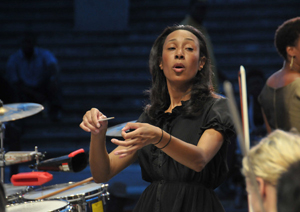 The Chicago Sinfonietta will be led by not one, but two outstanding conductors at The Journey, the Dream. Sharing the podium with Mei-Ann Chen will be Jeri Lynn Johnson, founder and Music Director of the Black Pearl Chamber Orchestra. Two selections will be led by each conductor, and they will lead Charles Ives’ complex Central Park in the Dark together.
The Chicago Sinfonietta will be led by not one, but two outstanding conductors at The Journey, the Dream. Sharing the podium with Mei-Ann Chen will be Jeri Lynn Johnson, founder and Music Director of the Black Pearl Chamber Orchestra. Two selections will be led by each conductor, and they will lead Charles Ives’ complex Central Park in the Dark together.
The Sinfonietta and Black Pearl share a mission as well. Based in Philadelphia, the Black Pearl Chamber Orchestra is the only professional orchestra in the region, and one of few in the country, to champion ethnic diversity in classical music. Much like the Sinfonietta, the orchestra presents concerts and community programs of the highest artistic and educational standard, performed by ethnically diverse musicians who represent Philadelphia’s rich cultural diversity.
Jeri Lynn Johnson began conducting during her doctoral studies in music theory and history at the University of Chicago. Her conducting teachers and mentors have included Sir Simon Rattle, Marin Alsop (a mentor to Mei-Ann as well) and Daniel Barenboim among others. In 2005 Ms. Johnson made history as the first African-American woman to win an international conducting prize when she was awarded the Taki Concordia Conducting Fellowship.
Jeri Lynn Johnson has two websites, one for her various projects and the other dedicated to Black Pearl.
[/one_half]
[one_half_last]
The video features a recent profile and interview with Jeri Lynne Johnson produced by WHYY, Philadelphia’s PBS station.
[/one_half_last]
[one_half]
Nicole Mitchell, flute and composer
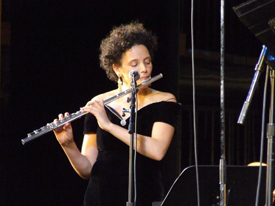 Flutist, composer, educator, and bandleader, Nicole Mitchell keeps collecting honors. Newly named recipient of the Herb Alpert Award in Arts, Nicole was chosen “Flutist of the Year” in 2010 by the Jazz Journalists Association, the second time to be so named. She was designated DownBeat’s Rising Star Flutist 2005-08 and the Chicago Tribune’s Chicagoan of the Year 2006. Founder of critically acclaimed Black Earth Ensemble and Black Earth Strings, Mitchell composes for contemporary ensembles of varying instrumentation and size (from solo to orchestra) while incorporating improvisation and a wide aesthetic expression. Her compositions reach across sound worlds, integrating new music with moments in the legacy of jazz, gospel, pop and African percussion.
Flutist, composer, educator, and bandleader, Nicole Mitchell keeps collecting honors. Newly named recipient of the Herb Alpert Award in Arts, Nicole was chosen “Flutist of the Year” in 2010 by the Jazz Journalists Association, the second time to be so named. She was designated DownBeat’s Rising Star Flutist 2005-08 and the Chicago Tribune’s Chicagoan of the Year 2006. Founder of critically acclaimed Black Earth Ensemble and Black Earth Strings, Mitchell composes for contemporary ensembles of varying instrumentation and size (from solo to orchestra) while incorporating improvisation and a wide aesthetic expression. Her compositions reach across sound worlds, integrating new music with moments in the legacy of jazz, gospel, pop and African percussion.
Long a mainstay of the Chicago music scene, she has recently moved to California to take a teaching position at University of California: Irvine. The premiere performance of Harambee: The Road to Victory reunites her with the Chicago Sinfonietta, where was an integral part of the flute section for many years. Harambee also marks her second orchestral premiere in as many months, following a December performance of her Flight for Freedom by the Chicago Composers Orchestra.
NOTE: Because of a family emergency, Nicole Mitchell is not able to perform on the World Premiere of Harambee: Road to Victory. She has personally selected a protege, flutist Kedgrick Pullums, to play in her place.
[/one_half]
[one_half_last]
The video is of the Black Earth Ensemble performing Honoring Grace, her tribute to Michelle Obama that was commissioned by the Jazz Institute of Chicago.
[/one_half_last]
[one_half]
Apostolic Church of God Sanctuary Choir
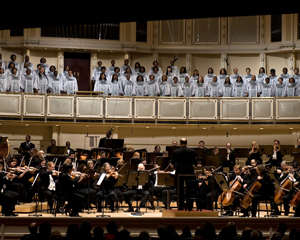 Long time patrons of the Chicago Sinfonietta know the power of the Apostolic Choir. The first collaboration between the two groups occurred in 1989, and members of the choir participated in Maestro Paul Freeman’s farewell concert last May. In between are eight more performances spanning over two decades. Maestro Freeman even invited them to Prague to perform with the Czech National Symphony.
Long time patrons of the Chicago Sinfonietta know the power of the Apostolic Choir. The first collaboration between the two groups occurred in 1989, and members of the choir participated in Maestro Paul Freeman’s farewell concert last May. In between are eight more performances spanning over two decades. Maestro Freeman even invited them to Prague to perform with the Czech National Symphony.
The Sanctuary Choir has been an anchor for the music ministry of the Apostolic Church of God throughout the seventy-plus year history of the church. The music focus of the choir is centered on quality presentations of sacred music including anthems, gospel, hymns and inspirational songs. They’ve appeared in concert with everyone from Gladys Knight to Wynton Marsalis. The Choir is currently led by Music Director Chip Johnson and conductor Willetta Greene-Johnson.
[/one_half]
[one_half_last]
The video is from an Apostolic Church Christmas program and features Gladys Knight on a medley of gospel favorites with the Choir.
[/one_half_last]
THE COMPOSERS
[one_half]
Zoltán Kodály – Dances of Galánta (Galánti táncok)
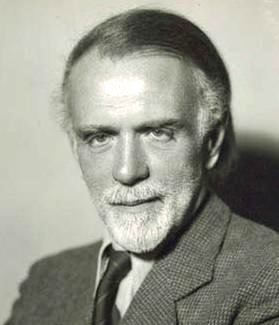 Along with Béla Bartók, Zoltán Kodály is one of the two major figures in Hungarian music in the twentieth century. Composer, pioneering ethnomusicologist, groundbreaking educationalist and critic, Kodály enjoyed a status in his native land that is perhaps unrivalled by any other figure anywhere else in the world. Kodály was born in Kecskemét, in Hungary, in 1882. Though from a musical family, his initial inclination was towards literary studies. As his father was a railway official, the Kodály family had a rather peripatetic existence: from 1884 until 1891 they lived in Galánta (later to be immortalized in the orchestral dances Kodály based on folk music from the area), then moving to Nagyszombat, where Zoltán studied violin and piano and sang in the cathedral choir.
Along with Béla Bartók, Zoltán Kodály is one of the two major figures in Hungarian music in the twentieth century. Composer, pioneering ethnomusicologist, groundbreaking educationalist and critic, Kodály enjoyed a status in his native land that is perhaps unrivalled by any other figure anywhere else in the world. Kodály was born in Kecskemét, in Hungary, in 1882. Though from a musical family, his initial inclination was towards literary studies. As his father was a railway official, the Kodály family had a rather peripatetic existence: from 1884 until 1891 they lived in Galánta (later to be immortalized in the orchestral dances Kodály based on folk music from the area), then moving to Nagyszombat, where Zoltán studied violin and piano and sang in the cathedral choir.
Dances of Galánta, like many of Kodály’s compositions, presented an authentic Hungarian national idiom in a manner that allowed it international prominence. A lively yet sometimes reflective work, it begins this tribute to Dr. Martin Luther King, Jr. in celebratory fashion.
The International Kodály Society website has lots of interesting material. [/one_half]
[one_half_last]
The video takes a folkier approach to Galánti tácok using a smaller traditional ensemble.
[/one_half_last]
[one_half]
Ludwig van Beethoven – Fidelio: Overture, op. 72C
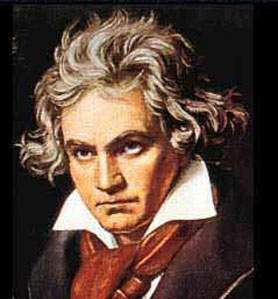 Somehow, in classical music, it almost always comes back to Beethoven. His compositions have been a major part of the standard repertoire for so long that it is easy to forget that, in the late 18th century, Beethoven was every bit the radical that Charles Ives would be two centuries later.
Somehow, in classical music, it almost always comes back to Beethoven. His compositions have been a major part of the standard repertoire for so long that it is easy to forget that, in the late 18th century, Beethoven was every bit the radical that Charles Ives would be two centuries later.
Fidelio was Beethoven’s only opera, and its narrative is especially appropriate for a concert honoring Dr. King’s legacy. The opera tells how Leonore, disguised as a prison guard named “Fidelio”, rescues her husband Florestan from death in a political prison. It is a story of personal sacrifice, heroism and eventual triumph with its underlying struggle for liberty and justice mirroring 18th century political movements in Europe, and indeed, the continuing struggle in the United States today as well.
As an overture, this performance does not literally follow the narrative, but rather provides an interlude to contemplate its themes.
Click here for a story synopsis. [/one_half]
[one_half_last]
The video is of a Fritz Reiner / CSO recording from 1955.
[/one_half_last]
[one_half]
Charles Ives – Central Park in the Dark
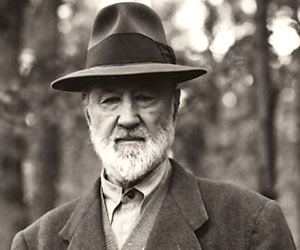 For all his singularity, Charles Ives is among the most representative of American artists. Optimistic, idealistic and fiercely democratic, he unified the voice of the American people with the forms and traditions of European classical music. The result, in his most far-reaching work, is like nothing ever imagined before him: music at once unique and as familiar as a tune whistled in childhood.
For all his singularity, Charles Ives is among the most representative of American artists. Optimistic, idealistic and fiercely democratic, he unified the voice of the American people with the forms and traditions of European classical music. The result, in his most far-reaching work, is like nothing ever imagined before him: music at once unique and as familiar as a tune whistled in childhood.
Central Park in the Dark, called the first radical musical work of the twentieth century, is a prime example. Written in 1906, the piece evokes an evening comparing sounds from nearby nightclubs in Manhattan (playing the popular music of the day, ragtime, quoting Hello! Ma Baby and even Sousa’s Washington Post March) with the mysterious dark and misty qualities of the Central Park woods. The vast disparity between the ‘urban’ and ‘rural’ themes will be handled here by the two conductors, Mei-Ann Chen and Jeri Lynne Johnson, on stage together. Nonetheless, what they will create by working together will be a singular piece, a fitting metaphor in a program dedicated to the legacy of MLK.
More on Ives can be found at the Charles Ives Society website. [/one_half]
[one_half_last]
Note, in this YouTube clip, how the hovering strings are gradually joined and then are nearly overwhelmed by the cacophony, only to reassert themselves. [/one_half_last]
Nicole Mitchell – Harambee: The Road to Victory for Flute, Choir and Orchestra
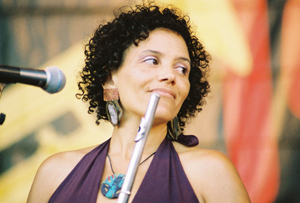 Nicole Mitchell’s own words are likely the best way to understand Harambee:
Nicole Mitchell’s own words are likely the best way to understand Harambee:
“Harambee: The Road to Victory joyfully celebrates the spirit of liberation itself, in appreciation for all those who have dedicated their lives towards bringing a higher quality of life to humanity, including Martin Luther King, Harriet Tubman, Ghandi and countless others. Harambee (Har-am-bay), a swahili word for ‘bringing together’, and the lyrics are designed to inspire us to honor our differences as wonderful attributes of nature while we come together as one to help each other toward a better life. In times of extreme emergency and hardship, Harambee (uniting) happens magically and instantly so that we can all manifest a common need. If we can access that feeling of oneness globally and in each moment, social justice can be achieved in all arenas. The concept for Harambee was originally performed in Poznan, Poland with a multi-cultural jazz ensemble of musicians from the Association for the Advancement of Creative Musicians and Asian Arts-Midwest. Commissioned by the Chicago Sinfonietta, Harambee is a world premiere for a solo flutist, choir and orchestra that merges classical music, pop, gospel and jazz.
What divides us is only illusion. Heart and soul we only have one: one mind, one life, one story to leave behind.”
More on Nicole Mitchell can be found here.
Various Composers – Gospel Music for Orchestra and Choir
Songs of hope and praise serve as the climax to this celebration. Arranged and performed by the Apostolic Church of God Sanctuary Choir and conducted by Mei-Ann Chen and guest conductors Chip Johnson and Willetta Greene-Johnson, these gospel works are certainly a triumphant way to end a program celebrating Dr. King. Give thanks with the exhilarating Total Praise and Give Him Praise. Total Praise is a hopeful hymn that uplifts the spirit, especially with its resounding chorus of “amens.” The praiseful celebration continues with Give Him Praise. Psalm 118: Sinfonietta builds from the previous hymns and give solace in its assurance that God’s “love endures forever.” Finally, be inspired by the jubilant Champion, with its victorious belief that “the Lord never knows defeat.”
Sweet Chariot is a project and website devoted to the history of spirituals, tracing them back to African roots, through slavery days, abolition and the freedom songs of the civil rights movement.
The Encyclopedia of Chicago looks at the origins of modern gospel music as developed on the South Side when spirituals were combined with elements of blues and jazz.
